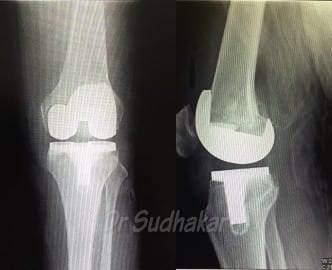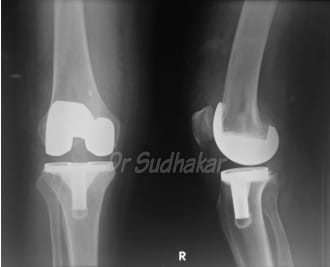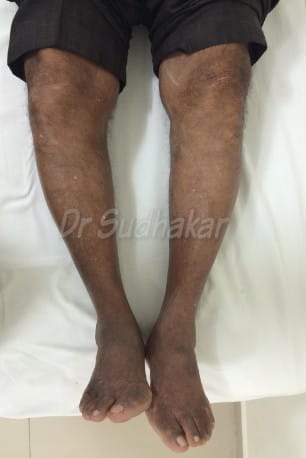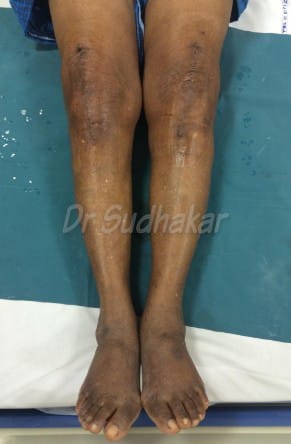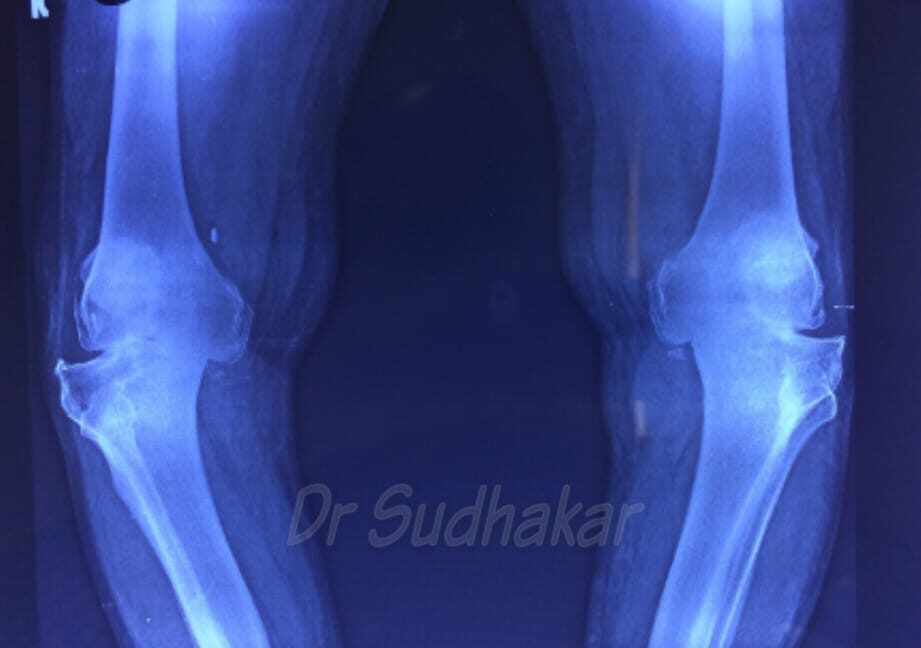Pictures for Total Knee Replacement - Pre and Post Surgery
Pre-op X-ray
What is Total Knee Replacement?
A total knee replacement is an operation to replace the worn areas of the knee joint with artificial components. Appropriate cuts are made in thigh bone (femur) and leg bone (tibia) and metallic components inserted in their place. The gap is filled with plastic component. Sometimes, the underside of knee cap may also be replaced depending on degree of arthritis and the preference of the surgeons. When in place, all components move together smoothly and relieve the painful movement of an arthritic knee.
When is Total Knee Replacement considered?
When pain caused by osteoarthritis severely limits your ability to walk, work or even perform simple activities and when initial conservative treatments are no longer helpful (medications, injections and physiotherapy) total knee replacement can give you a new lease of life and help regain your normal lifestyle.
What are other options/alternatives to Total Knee Replacement?
Other treatment options include weight loss, medications, injections or other types of surgery and should be discussed with your Doctor. Total Knee replacement may be considered after careful diagnosis of your joint problem and the degree of arthritis you have - Early arthritis - optimum weight, physio, analgesics, injections, using stick on the opposite side Moderate - All of the above, sometimes arthroscopy or partial replacement Severe or symptoms bad - partial or complete knee replacement or Fusion of knee joint I would weigh the benefits of each procedure and inform you accordingly.
What will happen after surgery?
In general you will be encouraged to walk and bend you knee as soon as possible after the operation. The hospital stay varies depending on your progress. All patients follow a dedicated postoperative care programme with instructions to help you recovery in the first days after your surgery.
What is the success rate? / How long does this new knee last?
I am happy to discuss any questions or concerns you may have, however knee replacement surgery is acknowledged as one of the most successful and life changing operations performed today. Various factors such as age of the patient, weight and activity level have an influence on the long term results. For simplicity, it can be said that if we operate on 100 patients and see them after 10 years about 90 to 95 of them are doing well.
What should I expect in the future with my Total Knee Replacement?
Immediately after the operation you should have relief from the pain of osteoarthritis in that knee. However, it is likely you will experience some discomfort arising from the operation itself in the days following surgery. Most patients can resume normal day-to-day activities including walking, shopping and stair climbing. Low impact sports are possible. The result of a total knee replacement depends to an extent on the individual patient and the patient's commitment to their physio and rehabilitation programme. Factors such as age, weight and activity level can also affect the outcome. I am happy to advise you on specific instructions for other activities.
How long does the procedure usually take?
The operation usually takes one to two hours. From the time you are taken from the ward and your return to the ward will take few hours as following operation, you will be kept in recovery ward till you recover fully from the operation.
How long would I stay in the Hospital?
Most people stay for 3-5 days. The factors which decide length of your stay at hospital are - Your age, pre-op health, how you used to walk before the procedure, associated medical problems, any problems after operation itself, your mental attitude and the help you have at home etc.,
When can I walk after the operation?
Usually the next day once we are happy that you have made a good recovery from the operation and all your observations are satisfactory. Take things one at a time and do so at your own pace. In the first few days you will walk with a walker with the help of physiotherapist. Once you have made reasonable progress, you might use crutches. With time you might want to walk with one crutch and finally without any!!!!!!. Remember every one is different and it is quiet normal if you are using a crutch at 6 weeks.
What will happen after discharge?
You may need home or outpatient physiotherapy sessions for supervised exercises. Speak to your doctor or physiotherapist regarding the frequency or duration of physio required.
When can I drive?
Usually after 6 weeks. In general, once you are able to walk without crutches or sticks without a limp, you are able to drive.
When can I return to work?
Most people will be off for around 3 months. If your work is sedentary or supervisory, you can return as a part timer doing light duties at 6 weeks provided you have some control on your working environment.
What problems can happen ?
As every thing else in life, there are pros and cons for anything we do. The good thing about the knee replacement is if the operation is successful, you will have a near painless knee to enable you to carryout most of your daily activities. The things that can go wrong are COMMON: (2-5%)
- Pain: the knee will be sore after the operation. If you are in pain, it’s important to tell staff so that medicines can be given. Pain will improve with time. Rarely, pain will be a chronic problem & may be due to any of the other complications listed below, or, for no obvious reason. Rarely, some replaced knees can remain painful.
- Bleeding: A blood transfusion or iron tablets may occasionally be required. Rarely, the bleeding may form a blood clot or large bruise within the knee which may become painful and require an operation to remove it.
- DVT:(deep vein thrombosis) is a blood clot in a vein. The risks of developing a DVT are greater after any surgery (and especially bone surgery). You may give you medication to try and limit the risk of DVTs from forming. Starting to walk and moving early is one of the best ways to prevent blood clots from forming
- Knee stiffness: may occur after the operation, especially if the knee is stiff before the surgery. Manipulation of the joint (under general anaesthetic) may be necessary
- Prosthesis wear: With modern operating techniques and new implants, knee replacements last many years. In some cases, they fail earlier. The reason is often unknown. The plastic bearing is the most commonly worn away part
LESS COMMON: (1-2%)
- Infection: You will be given antibiotics at the time of the operation and the procedure will also be performed in sterile operation theatre conditions with sterile equipment. Despite this infections still occur (1 to 2%). The wound site may become red, hot and painful. There may also be a discharge of fluid or pus. This is usually treated with antibiotics and an operation to washout the joint may be necessary. In rare cases, the prostheses may be removed and replaced at a later date. The infection can sometimes lead to sepsis (blood infection) and strong antibiotics are required.
RARE: (<1%)
- Pulmonary embolism (PE) is the spread of a blood clot to the lungs and can affect your breathing. This can be fatal.
- Altered leg length: the leg which has been operated upon, may appear shorter or longer than the other.
- Altered wound healing: the wound may become red, thickened and painful (keloid scar)
- Nerve Damage: efforts are made to prevent this, however damage to the small nerves of the knee is a risk. This may cause temporary or permanent altered sensation around the knee. There may also be damage to the Peroneal Nerve, this may cause temporary or permanent weakness or altered sensation of the lower leg. Changed sensation to the outer half of the knee may be normal.
- Bone Damage: bone may be broken when the implant / prosthesis is inserted. This may require fixation, either during or at a later operation.
- Blood vessel damage: the vessels at the back of the knee may rarely be damaged. may require further surgery

ASK A QUERY
Do you have a question? Ask here.
+91-9392243393

CONTACT ME
Get in Touch With Dr. Sudhakar Reddy
Continental Hospitals,
Plot No 3, Rd Number 2, Financial District, Gachibowli, Nanakaramguda, Telangana 500032

BOOK APPOINTMENT
Click Here Book Your Appointment


